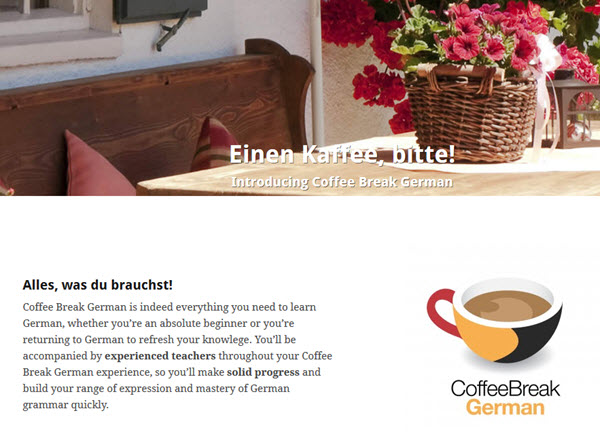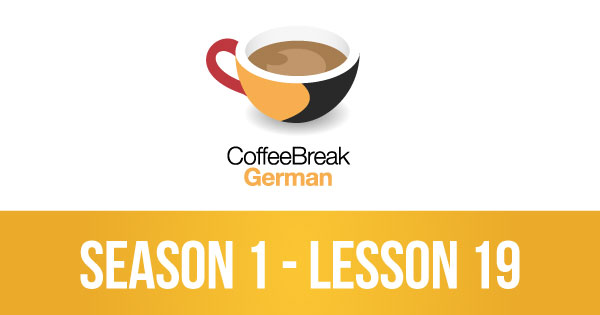
INTRODUCTION In the introduction to this lesson, you will see the first example of an um.

#Coffee break german pdf how to#
You’ll also learn how to use the dative case after certain prepositions.

You may wish to be specific and ask the pharmacist for medication for a particular condition.Coffee Break German Lesson 17 Study Notes Coffee Break German: Lesson 17 - Notes page 1 of 17 LESSON NOTES ES GIBT EINEN PARK ZWISCHEN DEM BAHNHOF UND DER KIRCHE In this lesson you’ll be learning much more language for dealing with a tourist information situation. I can’t / I cannot Coffee Break German: Lesson 23 - Notes page 5 of 19 We can then combine this with the infinitive form of the verb: schlafen to sleep ich kann nicht schlafen I can’t sleep ich kann nicht schlucken I can’t swallow ich kann nicht atmen I can’t breathe Another symptom you may have is dizziness: mir ist schwindlig I am dizzy Note the construction of this expression: it literally means “to me it is dizzy”. Here we use the modal verb können, meaning “to be able” in its conjugated form: ich kann nicht. der Husten the cough ich habe einen Husten I have a cough die Erkältung the cold ich habe eine Erkältung I have a cold die Infektion the infection ich habe eine Ohreninfektion I have an ear infection der Sonnenbrand the sunburn ich habe einen Sonnenbrand I have sunburn das Fieber the fever Coffee Break German: Lesson 23 - Notes page 4 of 19 ich habe (ein) Fieber I have a fever der Durchfall diarrhoea ich habe Durchfall I have diarrhoea die Verstopfung constipation If you are talking about someone else, use er hat (“he has”) or sie hat (“she has”): er hat Durchfall he has diarrhoea mein Sohn hat Durchfall my son has diarrhoea sie hat eine Erkältung she has a cold meine Tochter hat eine Erkältung my daughter has a cold If you are feeling unwell then another common situation is that you are unable to do something. Mark suggests some example sentences using this word in different cases: gibt es eine Apotheke in der Nähe? is there a pharmacy nearby? der Park ist neben der Apotheke the park is next to the pharmacy Coffee Break German: Lesson 23 - Notes page 3 of 19 In addition to Kopfschmerzen and Bauchschmerzen and the other aches and pains we learned in the previous lesson, we may also need to describe some specific symptoms in a pharmacy or to a doctor. Coffee Break German: Lesson 23 - Notes page 2 of 19 ich habe Kopfschmerzen I have a headache meine Hand tut mir Weh my hand hurts haben Sie Halsschmerzen? do you have a sore throat? (formal) hast du Halsschmerzen? do you have a sore throat? (informal) meine Beine tun mir Weh my legs hurt wo haben Sie Schmerzen? where does it hurt? (formal) wo tut es Ihnen Weh? where does it hurt? (formal) VISITING THE PHARMACY The word for pharmacy or chemist’s in German is die Apotheke. stimmt genau quite right, that’s right EIN BISSCHEN WIEDERHOLUNG Before continuing with the main content of this lesson, Thomas provides some translation challenges for Mark, based on the language covered in the previous lesson. Mark: Und wir sind heir um unser Deutsch zu verbessern. INTRODUCTION As usual, Thomas and Mark begin the audio lesson with a short introduction in German: Thomas: Hallo zusammen bei Coffee Break German! Mark: Herzlich Willkommen.

You’ll also learn about demonstrative adjectives, and about German traditions associated with the return to school.

Coffee Break German Lesson 23 Study Notes Coffee Break German: Lesson 23 - Notes page 1 of 19 LESSON NOTES HABEN SIE ETWAS GEGEN KOPFSCHMERZEN? In this lesson you’ll be continuing on from the last lesson and learning to deal with a visit to the pharmacy.


 0 kommentar(er)
0 kommentar(er)
